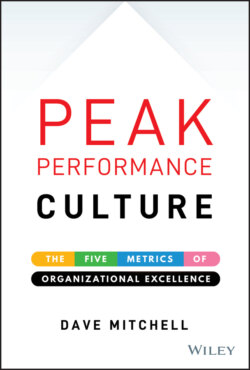Читать книгу Peak Performance Culture - Dave Mitchell - Страница 7
Introduction
ОглавлениеBy 1981, it had become clear that a debilitating lack of talent was likely to create a ceiling for my baseball career well below the major leagues. So it was, after my sophomore year of college, that I needed to choose a major. Since I had worked part‐time at a commercial radio station – shout out to WCRA/WCRC FM in Effingham, Illinois—and the closed‐circuit radio station on the college campus at Eastern Illinois University, I decided that Mass Communications would make the most sense. Heck, I might well become a sportscaster, the next best thing to nabbing the first baseman position for the New York Mets (my original occupational aspiration). My guidance counselor concurred but offered one suggestion. Given that I had a highgrade point average and appeared to arrive at my academic major largely based on convenience rather than aptitude, she encouraged me to augment my Mass Comm major with a business administration minor. You know, just in case my sportscasting career went the way of my baseball career.
When my broadcasting career fizzled – turns out the guidance counselor was on to something – I found myself without a clear idea about my professional future. I bounced around for a year – a very interesting year that you really should ask me about if we are having a glass of wine together. Eventually, I ended up in Chicago and working in retail. About six months into a job as a customer service representative – a job that essentially meant that you got yelled at by angry people for 8 hours and then went home to a frozen dinner alone in a roach‐infested apartment (but I don't want to romanticize it), a position as a trainer opened up. My first job in human resources development was teaching new hires how to use the point of sale system at Marshall Field's. I loved it.
The job was hard. I led eight‐hour training sessions on highly repetitive tasks. It wasn't sexy, or fun. At least it wasn't for most people, but it was for me. I still remember meetings with other store trainers during the holiday season hiring blitz. They all had the same look: dead eyes, expressionless face, shuffling gate, garbled muttering under their breath that sounded vaguely like a countdown until Thanksgiving—the unofficial end date of the seasonal hiring. Not me, however. I couldn't wait to get up in front of a new class, memorize their names, beguile them with stories of how to navigate a credit card sale to be shipped out of state as a gift to a third party using an American Express card. Good times. I had found my passion.
Unfortunately, I became the epitome of the “Peter Principle” – Laurence Peter's observation that people tend to get promoted until they reach their level of incompetence. I find Laurence's observations a little constrictive. I think the Peter Principle is broader than reaching a level of incompetence. I think many people simply reach a level of disinterest. After over a decade of promotions within the field of human resources development, I had reached an executive level that was entirely about strategies, budgets, staffing, and litigation defense. The area of passion that ignited my career – training and education – was nary a part of my last corporate job. I knew I needed to realign my profession with my joy.
